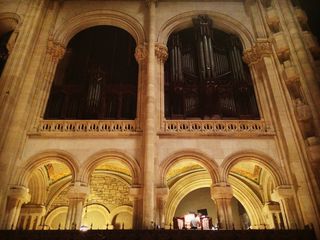An Epiphany
How a non-believer ended up in church.

Source: Dean Olsher
Thankfully, different voices spoke from within as well. As the Internal Family Systems model of psychotherapy shows us, we are all made up of multiple subpersonalities, or “parts,” and so I polled the group to hear what others had to say.
One part—no doubt the same one that has been paying ultra-close attention to the news lately—suggested I borrow a trick from the politician’s playbook: What if I reframed the debate? Making and inevitably breaking resolutions is a path to disappointment. Why not recategorize them instead as Habits to Cultivate That Will Make Life Better?
No longer was I facing an onerous list of chores. Suddenly this was a much more fun conversation about ways to improve my personal musical practice.
Practice is a tricky word in this context. The memory of being forced to play scales over and over, for example, might fill people with dread. I think about the word in the same way that Buddhists talk about their meditation practice. Making music part of everyday life is the best avenue to wellbeing that I know.
And so I reached deep within to figure out how this newly reframed endeavor—the cultivation of habits that will make life better—would play out. This time a different, unfamiliar voice spoke up and proposed something radical and completely unexpected. It told me to go to church.
This came as a rather huge surprise, as I am a dedicated non-believer. That said, I do love church music of all kinds. Bach, Anglican hymns, Renaissance polyphony.
And that is how I ended up on the first day of the year at the Saint John the Divine, the Episcopal cathedral in Manhattan, famous for its organ, musical programs and a history of political activism.
The usher seated me in the center of the front row, facing the choir and the Great Organ, rebuilt after being destroyed in a fire in December of 2001. I sat and contemplated the terrifying year that was about to unfold, in particular the systematic unraveling of the victories gained on behalf of the progressive social justice causes that were fought for by members of this congregation and, notably, the neighboring Riverside Church. I meditated on a question that had been occupying me for the past several months: How is a person of conscience supposed to act in a moment such as this?
Into this stream of thoughts a line from the sermon inserted itself. The pastor spoke about carrying a light in a world that doesn’t want to see it. Her remark triggered memories of clients at each extreme of the human lifespan—autistic children to older adults with dementia—who all respond to “This Little Light of Mine,” which, along with “You Are My Sunshine,” tops the music therapy hit parade.
I looked over to the far end of the building and felt comforted by the rose window, which has exuded a comforting glow since the Great Depression, through World War Two and other threats to our country’s existence.
Afterwards I crossed the street to the Hungarian Pastry Shop, hangout of Columbia University students, sat down to a poppy seed cake (after all, the resolution had been broken) and plotted my next move. I still didn’t fully understand why this part inside me had led me to Saint John the Divine on the first day of the year. That is the nature of epiphanies: They come out of nowhere, in the form you least expect. I did get a feeling that maybe I ought to pay attention to things I had been avoiding up until this point, and if I started listening closely, perhaps I might have a clearer sense of how to be and to act in the year ahead.

